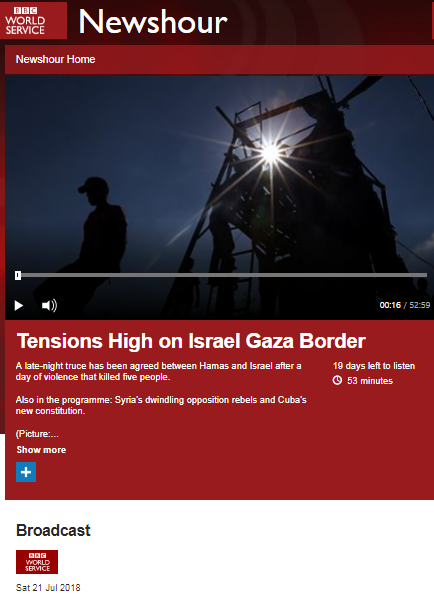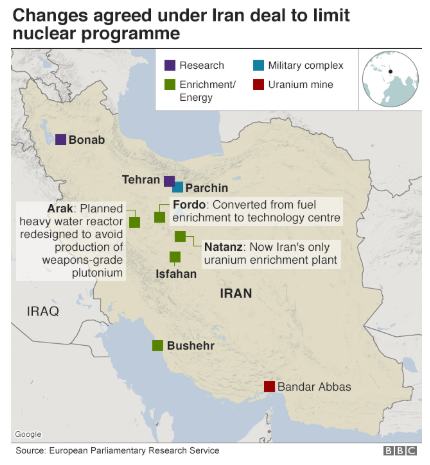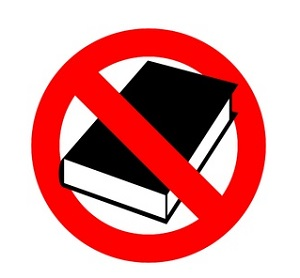h/t FB
The August 8th edition of BBC Radio 4’s ‘Today’ programme included an item (from 44:25 here) concerning a film about the Gaza Strip. Presenter John Humprys began with some unsurprising framing.
[emphasis in italics in the original, emphasis in bold added]
Humphrys: “Gaza is by any standards a pretty bleak place to live. Now a documentary called ‘Gaza’, which had its premiere at this year’s Sundance Film Festival, is about to be released in this country. It’s been called a portrait of Palestinian life in which a series of people talk about how they live amid restrictions and lack of any opportunity. Mishal has spoken to Garry Keane – co-director of the film – and Fadi Hussam Hannona the production manager in Gaza. She asked Garry Keane why he made the film.”
“Mishal” is of course the programme’s own Mishal Husain who has herself produced no small amount of one-sided reporting from or about the Gaza Strip in the past.
Keane: “The film was born out of a conversation I had back in 2012 with the documentary photographer Andrew McConnell. And I had always wanted to meet someone who had access to the Strip, who had an awareness of working on the ground there. And most importantly to meet someone who had shared, you know, shared my sensibilities about the situation there. So when we both realised that we had a passion for the plight of what we consider the trapped and tortured people of Gaza, we decided to combine our skills – as I was a documentary maker, he was a photographer – and join together to make a film about…from the point of view of the ordinary citizens of the Strip. So that conversation happened in 2012 and it took us until 2018 to finish.”
Following a clip from the film Husain introduced its production manager.
Husain: “Fadi Hannona – you were the production manager in Gaza. There are a series of individuals who are seen in the film. A couple of them are teenagers. How did you decide on those people and what was the process of filming on the ground in a place like Gaza like for you?”
Hannona: “Actually I didn’t decide. I understood what the directors wanted. The research took long time thinking about how we can present these characters to the audience in the right, most natural, real way. And look, the media around the world deal with Gaza only as a breaking news so we decide to do something completely different and we did. We have Gaza film now.”
Husain failed to challenge that inaccurate claim and listeners heard another clip from the film before her interviewee continued:
Hannona: “Gaza has been reduced to an image of violence and destruction on the news. OK yes; there’s conflicts…conflict in Gaza but people here just want to live a normal life and people want a chance. So we tried through our film to show the other side of Gaza: the side where the ordinary people are suffering every day.”
Husain: “Have the people featured in it – or indeed anyone in Gaza – got to see it?”
Hannona’s reply did not inform listeners that there is “no cinema in Gaza” any longer because it is ruled by an extremist Islamist terror organisation.
Hannona: “Actually no because there’s no cinema in Gaza and after what happened in Sundance I was very upset back then and I’m still very sad and angry about it. Not only did we miss the festival and the chance to present the film but it’s just another reminder of how wrong it is that we can’t travel. It’s, you know, it’s unjust.”
Husain: “You mean because you didn’t manage to get out of Gaza to go to the Sundance Festival yourself?”
Hannona: “Yeah I lost…yeah I lost [unintelligible] to bring me at Sundance. They close the border one day before I should leave Gaza.”
Listeners were not told to which of Gaza’s borders Hannona was referring or who “they” are. The Sundance Festival took place in the US between January 24th and February 3rd 2019. Egypt had closed its border crossing with the Gaza Strip earlier that month due to Hamas’ take-over of the Rafah Crossing after Palestinian Authority staff had been withdrawn. According to the UN that closure lasted until January 28th. On January 22nd:
“…shots were fired at Israeli troops stationed along the security fence across from the northern Strip. In response, an IDF tank destroyed a nearby observation post belonging to the Gaza-ruling Hamas terror group.
On Tuesday afternoon, during a small riot next to the border, another sniper opened fire at a group of soldiers positioned along the border, hitting a Paratroopers Brigade company commander in his helmet, causing light injuries.”
Whether or not that was the reason for a closure of the Erez Crossing is unclear but notably BBC audiences heard nothing about the responsibility of Palestinians for their travel difficulties.
Listeners heard another clip from the film before Husain went on:
Husain: “Garry Keane; do you think it is a fair portrait of Gaza? And I ask that because you talked about ‘trapped and tortured people’. The Hollywood Reporter felt that you airbrushed Hamas and its responsibility out of the story.”
The Hollywood Reporter review of the film includes the following:
“The press notes for Gaza say Hamas is one of the villains of the story, but that’s a ludicrous statement. Hamas may be one of the villains of the actual historical record, but it’s a non-factor in the documentary. Occasionally we pass by a military-affiliated figure with a rocket launcher or a machine gun, but to watch Gaza you’d think such weaponry was only used to be fired in the air when the Israelis free unjustly imprisoned Palestinians.”
Keane: “Ahm…we have been accused on occasion – on very few, you know, very limited occasions – of making a propaganda film for Hamas but anyone who claims that we feel has an agenda to serve. We show Hamas armed military wing on the streets conducting large rallies with enormous rockets on display. A character in the film says that Palestinian problems would be solved if Hamas weren’t there. We don’t serve the views of Hamas or any of their supporters. Our film is all about highlighting the effects of an unjust blockade on the ordinary people of Gaza. You know, a blockade that even the UN constitutes as collective punishment. So I think it’s ridiculous to say that, you know, that just because we disapprove of the actions of the Israeli government and want to highlight that, that we’re accused of racism or…this film is not about race or religion or about propaganda. It’s about human rights violations being perpetrated on two million citizens of the Gaza Strip. You know this is a film about promoting understanding.”
With nothing at all to say about the human rights of the Israeli civilians living for years under the shadow of Hamas terrorism, Husain closed the item there.
Husain: “Garry Keane and Fadi Hussam Hannona, thank you both.”
Once again BBC Radio 4 has presented a one-sided item which does not even pretend to fully inform audiences but promotes plenty of buzz words and slogans which conform to the corporation’s standard politicised messaging on the Gaza Strip.




